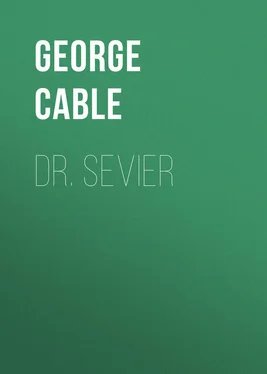George Cable - Dr. Sevier
Здесь есть возможность читать онлайн «George Cable - Dr. Sevier» — ознакомительный отрывок электронной книги совершенно бесплатно, а после прочтения отрывка купить полную версию. В некоторых случаях можно слушать аудио, скачать через торрент в формате fb2 и присутствует краткое содержание. Жанр: foreign_antique, foreign_prose, на английском языке. Описание произведения, (предисловие) а так же отзывы посетителей доступны на портале библиотеки ЛибКат.
- Название:Dr. Sevier
- Автор:
- Жанр:
- Год:неизвестен
- ISBN:нет данных
- Рейтинг книги:4 / 5. Голосов: 1
-
Избранное:Добавить в избранное
- Отзывы:
-
Ваша оценка:
- 80
- 1
- 2
- 3
- 4
- 5
Dr. Sevier: краткое содержание, описание и аннотация
Предлагаем к чтению аннотацию, описание, краткое содержание или предисловие (зависит от того, что написал сам автор книги «Dr. Sevier»). Если вы не нашли необходимую информацию о книге — напишите в комментариях, мы постараемся отыскать её.
Dr. Sevier — читать онлайн ознакомительный отрывок
Ниже представлен текст книги, разбитый по страницам. Система сохранения места последней прочитанной страницы, позволяет с удобством читать онлайн бесплатно книгу «Dr. Sevier», без необходимости каждый раз заново искать на чём Вы остановились. Поставьте закладку, и сможете в любой момент перейти на страницу, на которой закончили чтение.
Интервал:
Закладка:
“Ziss pless? ’Tis not ze pless! Zis pless – is diss’nt pless! I am diss’nt woman, me! Fo w’at you come in yeh?”
“My dear madam! My husband” —
“Dass you’ uzban’?” pointing at him.
“Yes!” cried the two Richlings at once.
The woman folded her arms again, turned half-aside, and, lifting her eyes to the ceiling, simply remarked, with an ecstatic smile: —
“Humph!” and left the pair, red with exasperation, to find the street again through the darkening cave of the stair-way.
It was still early the next morning, when Richling entered his wife’s apartment with an air of brisk occupation. She was pinning her brooch at the bureau glass.
“Mary,” he exclaimed, “put something on and come see what I’ve found! The queerest, most romantic old thing in the city; the most comfortable – and the cheapest! Here, is this the wardrobe key? To save time I’ll get your bonnet.”
“No, no, no!” cried the laughing wife, confronting him with sparkling eyes, and throwing herself before the wardrobe; “I can’t let you touch my bonnet!”
There is a limit, it seems, even to a wife’s subserviency.
However, in a very short time afterward, by the feminine measure, they were out in the street, and people were again smiling at the pretty pair to see her arm in his, and she actually keeping step . ’Twas very funny.
As they went John described his discovery: A pair of huge, solid green gates immediately on the sidewalk, in the dull façade of a tall, red brick building with old carved vinework on its window and door frames. Hinges a yard long on the gates; over the gates a semi-circular grating of iron bars an inch in diameter; in one of these gates a wicket, and on the wicket a heavy, battered, highly burnished brass knocker. A short-legged, big-bodied, and very black slave to usher one through the wicket into a large, wide, paved corridor, where from the middle joist overhead hung a great iron lantern. Big double doors at the far end, standing open, flanked with diamond-paned side-lights of colored glass, and with an arch at the same, fan-shaped, above. Beyond these doors and showing through them, a flagged court, bordered all around by a narrow, raised parterre under pomegranate and fruit-laden orange, and over-towered by vine-covered and latticed walls, from whose ragged eaves vagabond weeds laughed down upon the flowers of the parterre below, robbed of late and early suns. Stairs old fashioned, broad; rooms, their choice of two; one looking down into the court, the other into the street; furniture faded, capacious; ceilings high; windows, each opening upon its own separate small balcony, where, instead of balustrades, was graceful iron scroll-work, centered by some long-dead owner’s monogram two feet in length; and on the balcony next the division wall, close to another on the adjoining property, a quarter circle of iron-work set like a blind-bridle, and armed with hideous prongs for house-breakers to get impaled on.
“Why, in there,” said Richling, softly, as they hurried in, “we’ll be hid from the whole world, and the whole world from us.”
The wife’s answer was only the upward glance of her blue eyes into his, and a faint smile.
The place was all it had been described to be, and more, – except in one particular.
“And my husband tells me” – The owner of said husband stood beside him, one foot a little in advance of the other, her folded parasol hanging down the front of her skirt from her gloved hands, her eyes just returning to the landlady’s from an excursion around the ceiling, and her whole appearance as fresh as the pink flowers that nestled between her brow and the rim of its precious covering. She smiled as she began her speech, but not enough to spoil what she honestly believed to be a very business-like air and manner. John had quietly dropped out of the negotiations, and she felt herself put upon her mettle as his agent. “And my husband tells me the price of this front room is ten dollars a month.”
“Munse?”
The respondent was a very white, corpulent woman, who constantly panted for breath, and was everywhere sinking down into chairs, with her limp, unfortified skirt dropping between her knees, and her hands pressed on them exhaustedly.
“Munse?” She turned from husband to wife, and back again, a glance of alarmed inquiry.
Mary tried her hand at French.
“Yes; oui, madame . Ten dollah the month — le mois .”
Intelligence suddenly returned. Madame made a beautiful, silent O with her mouth and two others with her eyes.
“Ah non ! By munse? No, madame. Ah-h! impossybl’! By wick , yes; ten dollah de wick! Ah!”
She touched her bosom with the wide-spread fingers of one hand and threw them toward her hearers.
The room-hunters got away, yet not so quickly but they heard behind and above them her scornful laugh, addressed to the walls of the empty room.
A day or two later they secured an apartment, cheap, and – morally – decent; but otherwise – ah!
CHAPTER VII.
DISAPPEARANCE
It was the year of a presidential campaign. The party that afterward rose to overwhelming power was, for the first time, able to put its candidate fairly abreast of his competitors. The South was all afire. Rising up or sitting down, coming or going, week-day or Sabbath-day, eating or drinking, marrying or burying, the talk was all of slavery, abolition, and a disrupted country.
Dr. Sevier became totally absorbed in the issue. He was too unconventional a thinker ever to find himself in harmony with all the declarations of any party, and yet it was a necessity of his nature to be in the mêlée . He had his own array of facts, his own peculiar deductions; his own special charges of iniquity against this party and of criminal forbearance against that; his own startling political economy; his own theory of rights; his own interpretations of the Constitution; his own threats and warnings; his own exhortations, and his own prophecies, of which one cannot say all have come true. But he poured them forth from the mighty heart of one who loved his country, and sat down with a sense of duty fulfilled and wiped his pale forehead while the band played a polka.
It hardly need be added that he proposed to dispense with politicians, or that, when “the boys” presently counted him into their party team for campaign haranguing, he let them clap the harness upon him and splashed along in the mud with an intention as pure as snow.
“Hurrah for” —
Whom it is no matter now. It was not Fremont. Buchanan won the race. Out went the lights, down came the platforms, rockets ceased to burst; it was of no use longer to “Wait for the wagon”; “Old Dan Tucker” got “out of the way,” small boys were no longer fellow-citizens, dissolution was postponed, and men began to have an eye single to the getting of money.
A mercantile friend of Dr. Sevier had a vacant clerkship which it was necessary to fill. A bright recollection flashed across the Doctor’s memory.
“Narcisse!”
“Yesseh!”
“Go to Number 4 °Custom-house street and inquire for Mr. Fledgeling; or, if he isn’t in, for Mrs. Fledge – humph! Richling, I mean; I” —
Narcisse laughed aloud.
“Ha-ha-ha! daz de way, sometime’! My hant she got a honcl’ – he says, once ’pon a time” —
“Never mind! Go at once!”
“All a-ight, seh!”
“Give him this card” —
“Yesseh!”
“These people” —
“Yesseh!”
“Well, wait till you get your errand, can’t you? These” —
“Yesseh!”
“These people want to see him.”
“All a-ight, seh!”
Narcisse threw open and jerked off a worsted jacket, took his coat down from a peg, transferred a snowy handkerchief from the breast-pocket of the jacket to that of the coat, felt in his pantaloons to be sure that he had his match-case and cigarettes, changed his shoes, got his hat from a high nail by a little leap, and put it on a head as handsome as Apollo’s.
Читать дальшеИнтервал:
Закладка:
Похожие книги на «Dr. Sevier»
Представляем Вашему вниманию похожие книги на «Dr. Sevier» списком для выбора. Мы отобрали схожую по названию и смыслу литературу в надежде предоставить читателям больше вариантов отыскать новые, интересные, ещё непрочитанные произведения.
Обсуждение, отзывы о книге «Dr. Sevier» и просто собственные мнения читателей. Оставьте ваши комментарии, напишите, что Вы думаете о произведении, его смысле или главных героях. Укажите что конкретно понравилось, а что нет, и почему Вы так считаете.












